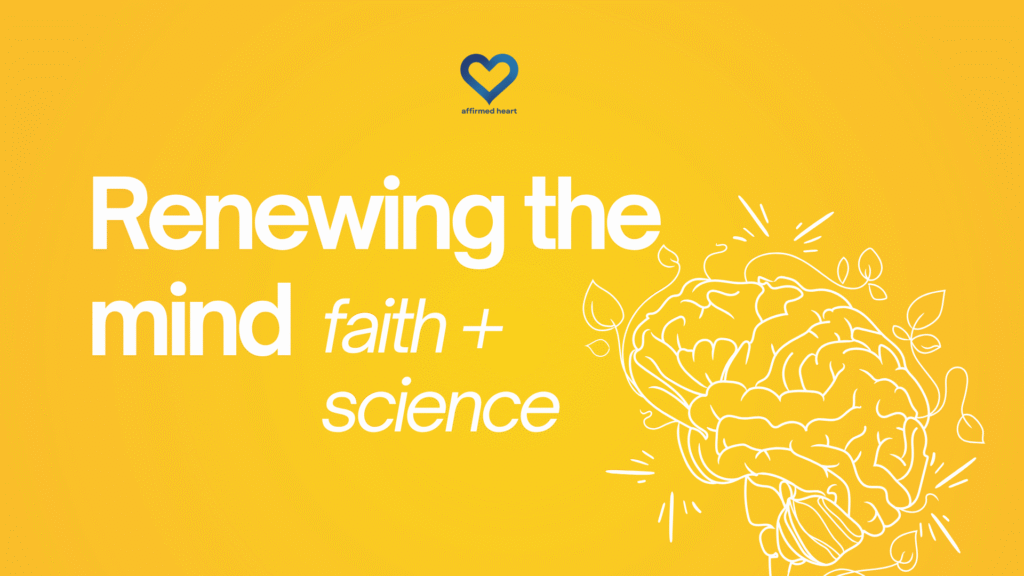
Renewing the Mind: What Faith Teaches and Science Confirms
Renewing the mind is a desire deeply rooted in the human experience. People of faith often feel called to renew their thinking so they can live with greater clarity, purpose, and freedom from negative patterns. While we often think of the mind in terms of thoughts, emotions, and memories, there is also a biological story behind the transformation we seek.
Renewing the Mind : Faith + Science
“Be transformed by the renewing of your mind.” Romans 12:2
Affirming God-given truth (e.g. “I am loved,” “I am created with purpose”) activates the ventromedial prefrontal cortex, which integrates identity, meaning, and self-worth.
Neuroscience shares that value-based affirmations activate neuroplasticity circuits, helping the brain form new, healthier patterns. Which supports the ‘renewing’ in scripture.
How the Mind and Brain Work Together
For our mind to be renewed, we must know what our mind consists of. Our mind includes our:
- thoughts
- beliefs
- mood
- memories
- interpretations of life
Behind all of this is the brain, a physical organ made up of networks of neurons (brain cells) that store and process these experiences.
The renewal and transformation of the mind has processes that translate beyond words but rather divine workings of God in our brain. There are two regions which play an especially important role in renewing the mind:
- The Prefrontal Cortex (PFC)
This is the part of the brain responsible for decision-making, self-control, emotional regulation, and choosing new responses.
- The Hippocampus
This region helps form memories, supports learning, and is one of the few areas where adult neurogenesis occurs, meaning new brain cells can grow throughout life.
How Brain Cells Shape Thoughts and Feelings
Every day, the hippocampus produces new neurons. These new cells grow and connect to existing networks, influencing how we think, feel, and remember. The renewing of the mind is a daily act beyond feelings and expectations. It is a partnership of deliberate and divine decisions.
The brain works through networks of connected cells.
When a thought, feeling, or memory is repeated, the network holding it becomes stronger. This is why:
- repeated thoughts become beliefs
- repeated emotional states become moods
- repeated memories feel more vivid and powerful
On the other hand, when we learn new truths or practice new thinking patterns, new neurons can connect into new networks—gradually weakening old, unhelpful patterns.
This is the biological foundation for the spiritual idea of “renewing the mind.”
So, how is the mind renewed?
The mind is renewed when:
- new brain cells grow
- these cells mature
- they form new, healthier connections
- old, unhelpful networks fade or break down
- God’s truth is believed
As new cells integrate into networks that focus on truth, hope, and growth, the brain literally rewires itself. Whilst the divine act of God begins transforming the mind.
The Expansion Process: Neuroplasticity
This rewiring is called neuroplasticity—the brain’s ability to change, grow, and adapt.
Neuroplasticity happens when:
- neurons create new connections
- old pathways weaken
- networks reorganize
- the brain becomes more efficient at supporting healthier thoughts and behaviours
As the brain is strengthened the changes are seen in the beliefs, mood and thoughts. The mind is renewed.
Meditating on Scripture Strengthens Neural Connectivity
“You will keep in perfect peace those whose minds are stayed on You.” (Isaiah 26:3)
“But his delight is in the law of the Lord, and on his law he meditates day and night.” (Psalm 1:2–3)
Neuroscience shares that meditation + affirmation strengthens:
- VMPFC <-> amygdala: connections (better emotional regulation)
- Default Mode Network: integration (sense of self, purpose, meaning)
As You Renew Your Mind On Identity in Christ, It Reduces Toxic Stress
“Perfect love casts out fear.” (1 John 4:18)
When you affirm their identity in Christ, the brain experiences:
- lower cortisol
- activated safety networks
- increased reward and peace signals
A neuroscience study reveals that Self-affirmations reduce stress responses in the brain.
Increases activity in the ventral striatum, associated with hope, motivation, and joy.
Your Takeaway:
What we repeatedly think, believe, and practice becomes the structure our brain builds.
This is where faith, psychology, and biology beautifully align. Renewing the mind is not only a spiritual practice. It is also a physical process happening inside the brain every day.
It’s your turn to repeat, renew and rebuild new thoughts, beliefs, memories and mood.
References
- Boldrini, M., et al. (2018). Human Hippocampal Neurogenesis Persists Throughout Aging. Cell Stem Cell, 22(4), 589–599.e5. https://doi.org/10.1016/j.stem.2018.03.015
- May, A. (2011). Experience-dependent structural plasticity in the adult human brain. Trends in Cognitive Sciences, 15(10), 475–482. https://doi.org/10.1016/j.tics.2011.08.002
-
Miller, E. K., & Cohen, J. D. (2001). An integrative theory of prefrontal cortex function. Annual Review of Neuroscience, 24, 167–202.
https://doi.org/10.1146/annurev.neuro.24.1.167 -
Newberg, A., & Waldman, M. R. (2010). How God Changes Your Brain: Breakthrough Findings from a Leading Neuroscientist. Ballantine Books.
